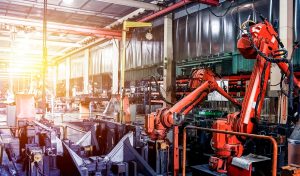
Lean manufacturing is a significant factor in global process technology success. Students enrolled in Process Technology (PT) programs prepare to become technicians and leaders in production efficiency in their chosen companies and industries. Contact ITI Technical College today for more information.
Current State Of Lean Manufacturing And Process Technology
Lean manufacturing and process technology are evolving to incorporate digital technologies and become “digital lean.” They emphasize data-driven decision-making and practice continuous improvement. This approach combines the core principles of lean with smart manufacturing and process technology practices like automation, advanced analytics, and artificial intelligence (AI).
 Lean manufacturing operations have become more efficient, flexible, and responsive. Key thrusts include leveraging IoT data, AI for optimization, and focusing on customer value and speed of responsiveness. Process technology students should be aware of these current trends:
Lean manufacturing operations have become more efficient, flexible, and responsive. Key thrusts include leveraging IoT data, AI for optimization, and focusing on customer value and speed of responsiveness. Process technology students should be aware of these current trends:
- Leveraging Technology: Lean manufacturing is moving beyond traditional approaches to embrace digital tools and technologies, such as IoT sensors, cloud computing, and AI.
- Data-Driven Decision: Digital lean emphasizes using data to identify bottlenecks, optimize processes, and make informed decisions, and less subjective opinions.
- Industry 4.0 Integration: The integration of Industry 4.0 principles, such as smart factories and interconnected systems, enhances Lean’s ability to adapt to changing market demands.
What Students Learn In A Process Technology Degree Program
Process Technology degree programs prepare students with knowledge and skill-based training and education to work in various industries. The objective is to prepare students to successfully operate industrial process equipment in entry-level positions, including:
- Chemical Process Technician
- Power Plant Technician
- Assistant Plant Operator
- Manufacturing Technician
- Water Treatment Technician
- Waste-Water Treatment Technician
- Petroleum Process Technician
- Natural Gas Process Technician
- Energy Plant Technician
Students receive training in classroom studies and laboratory work that apply to basic job responsibilities and requirements for efficient and quality production, including:
- Introduction to Industrial Process and Systems
- Success Skills in the Workplace
- Industrial Safety and Environmental Practices
- Review of Basic and Related Mathematics
- Process Instrumentation Concepts
- Pressure, Level, Temperature, Flow
- Mechanical and Fluid Dynamics
- Pump Applications, Operations, Maintenance, and Troubleshooting
- Compressors, Turbines, and Their Prime Movers
PT programs typically contain introductory courses in personal computers, technical writing, and workplace communication. Specialized training in computer-based control systems and troubleshooting is provided. Other courses are specific to equipment operation, such as furnace and boiler operation, heat exchanger theory, operating principles and problems, and distillation systems.
Chemistry courses include basic and organic chemistry and water treatment. Environmental awareness, ecology, industrial hygiene, and industry’s responsibility to the community are embedded throughout the program. Modern equipment, tools, and training aids are coupled with an environment solidly based on industrial process concepts.
|
“Students enrolled in Process Technology (PT) programs prepare to become technicians and leaders in production efficiency in their chosen companies and industries.” |
How Graduates Lead Efficiently In Their Industries
Process technology (PT) graduates apply the knowledge, principles, and skills they learn in technical college training to help efficiently lead their employers to success in their respective industries. Automated systems and robotics improve accuracy, reduce errors, and free up workers for higher-value tasks.
Process technicians use data analysis, analytics, and machine learning (ML) algorithms to provide insights into production processes, helping to identify and eliminate waste. They apply value stream mapping (VSM) to map the flow of materials and information to identify areas for improvement and waste reduction.
 Lean principles are increasingly applied to improve customer experiences and meet specific customer needs, such as customized products made with 3D printing. Lean manufacturing requires a culture of continuous improvement where employees are empowered to contribute ideas and participate in problem-solving.
Lean principles are increasingly applied to improve customer experiences and meet specific customer needs, such as customized products made with 3D printing. Lean manufacturing requires a culture of continuous improvement where employees are empowered to contribute ideas and participate in problem-solving.
Benefits Of Lean Manufacturing And Process Technology
Lean manufacturing combined with the latest process technology advancements generates many benefits. Process technology program graduates learn to apply principles that make producers more effective and competitive, including:
- Cost Reduction: By reducing or eliminating waste and optimizing processes, digital lean helps reduce costs across the value chain.
- Enhanced Flexibility: Digital technologies enable manufacturers to respond quickly to changing customer demands and market conditions.
- Improved Quality: Automation and data analysis can lead to reduced defects and improved product quality.
- Increased Competitiveness: Lean manufacturing helps companies stay competitive in a global market by improving efficiency, quality, and responsiveness.
- Increased Efficiency: Digital lean manufacturing and process technology help reduce waste, optimize processes, and improve overall efficiency.
If you are interested in lean manufacturing and process technology, learn how to become an efficient employee and leader in this field. Earn an Associate of Occupational Studies (AOS) Degree in Process Technology to develop your career.
For more information about graduation rates, the median debt of students who completed the program, and other important information, please visit our website: https://iticollege.edu/disclosures/




